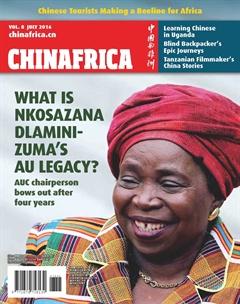African Safari
By Yu Nan

When he got married, Xu Chong promised his wife that one day, they would visit the land of his dreams - Africa. This summer, almost three decades later, the sexagenarian kept his promise. The Xus went on a 14-day journey to South Africa and Zimbabwe, savoring incredible new experiences, stunning natural beauty and wildlife, not to mention diversified cultures. By his estimate, the trip cost them over 30,000 yuan($4,615).
The Xus are among the millions of Chinese who have been showing a growing interest in traveling abroad in recent years. Last year, 120 million Chinese went abroad, a surging swell compared to the number in 1992 - 2.98 million, according to China National Tourism Administration data.
Africa, with its diverse attractions - from beaches and wildlife to cultural heritages - is fast becoming the destination of choice of well-heeled Chinese tourists. Research by the China Tourism Academy, a Beijingbased research institution, indicates Africa is seeing the fastest growth in Chinese travelers. In 2014, their number rose more than 80 percent year on year.
Chinas economic growth, many countries easing visa restrictions to tap the expanding Chinese tourist segment, and the start of direct flights between Chinese and foreign cities are among the reasons more Chinese are traveling abroad, the research says.
South Africa is reaping the benefits of the decision to ease the onerous new visa regulations. Subsequently, tourist arrivals from China rose 65.1 percent year on year in the first quarter of 2016, according to Statistics South Africa.
Exceptional experiences
Beijing UTour International Travel Service, a 21-yearold private travel agency in the Chinese capital, says it offers different African travel packages to different groups.
“We recommend Egypt to those who like ancient civilization, and Kenya to those who like observing spectacular wildlife migration. This way, we can cater to the needs of different ages, from the elderly to younger[tourists],” said Lu Peng, a senior tourism consultant with the agency.
“Most Chinese visitors to Africa are seasoned travelers who are seeking specialized - even personalized- tour packages as well as exotic holiday experiences,”Lu told ChinAfrica.
Such experiences dont come cheap. A 12-day trip to Morocco covering some of the North African countrys major cities like Casablanca, Marrakech, Merzouga and Rabat in August will cost around 20,800 yuan ($3,800).
While people like the Xus prefer to travel as part of a guided tour group, an increasing number of technology-savvy young Chinese are opting for self-guided tours.
Wang Hongren from Nanjing, capital of east Chinas Jiangsu Province, spent nearly a month on a budget tour of Kenya, South Africa, Tanzania and Ethiopia.
“The cozy, family-run hotel I lodged in in a South African village made me feel at home,” wrote the 27-year-old in her blog, sharing the travel experiences.“And it is very convenient and safe to travel self-driven in hired cars fitted with a GPS menu in Chinese.”
Wang likes to think of her trips as explorations, her own way of approaching the world. “New travel concepts give individual travelers [like me] an opportunity to rediscover ourselves,” she said.
She has been to more than 100 cities in 30 countries and regions, chalking up 200,000 km. The posts about her African trip garnered over 50,000 hits in 24 hours. “I hope the experience and tips will encourage more young Chinese to see the world,” she said.
Interactions between Chinese tourists and local people are good for the Chinese to appreciate foreign cultures and customs, according to her.
“During [our Africa] visit, we were impressed by the different cultures and cant wait to take another trip to see more outside of China,” Xu said. Now the couple is keen to go on a 16-day luxury cruise to the South Pole, even though it would mean spending at least over $20,000 per person.
There is a distinct change in the reason people are now giving for going abroad.
In the past, most outbound travel was related to business or work. Now more than 90 percent of it is for leisure, according to Li Xinjian, a professor of tourism at Beijing International Studies Universitys School of Management.
As consumers, Chinese tourists demand quality service, special experience and value for money, he said.
Bradley Brouwer, President of Asia Pacific of South African Tourism, agrees. “More and more Chinese tourists pay more attention to the quality of travel and favor in-depth theme travel than a mere glimpse of scenic spots. They will ask [travel agencies] to add what they have seen on TV to the itinerary,” he said.
“Formerly, they used to simply go sightseeing; now they prefer leisure-oriented [travel] and focus on game reserves, winery and other affordable luxuries [that South Africa can offer],” Brouwer told ChinAfrica. “[They are] an appealing market for us and the whole continent.”
How to travel safe
Apart from natures allure, visitors can also feel the friendly atmosphere while traveling in Africa, no matter whether they are elderly and traditional, like the Xus, or young and adventurous like Wang.
“Hospitable South Africans helped me out when my car stalled on the road,” Wang wrote in her blog. “I was overwhelmed by the kindness, charm and hospitality of the people.” She said she did not encounter any of the violence and crime reported in the media.
Xu said at the Kruger National Park in South Africa, they were assigned two local guides. Besides helping the couple observe the wildlife, the guides were also “dedicated to protecting us [from possible animal attacks] along the way,” adding to the feeling of being cared for.
“Most of the fears are created by [lack of correct and efficient] information,” said Brouwer. South Africa, he added, has always attached great importance to the safety of tourists and providing a better and safer tourism environment.
He has some advice for tourists visiting South Africa: choose an accredited travel agency for group travel and be safety conscious while traveling, like you would in any other part of the world.
He would also like to ask Chinese travelers not to carry too much cash with them. In South Africa, their payments can be made through UnionPay, the Chinese bank card that is being accepted in more and more foreign countries.
Li says Chinese tourists lack safety and legal awareness. His advice is that prior to any trip, especially overseas ones, travelers should make detailed contingency plans, just in case.

